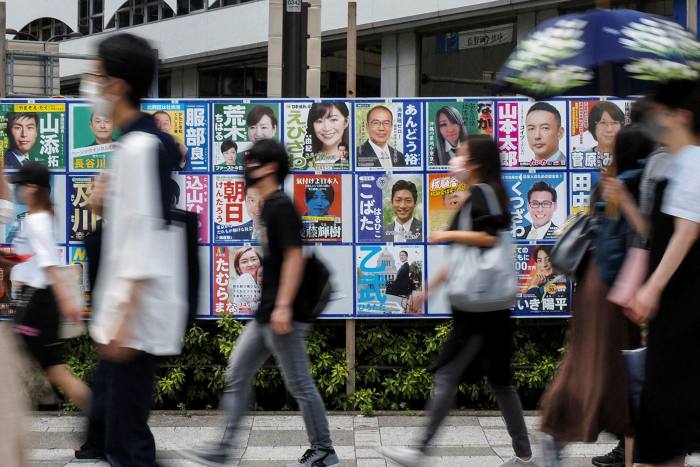Voters in Japan headed to polls on Sunday as the assassination of former prime minister Shinzo Abe cast a shadow over the country’s political future with the loss of its most polarising and influential leader in decades.
The elections for Japan’s upper house came two days after the country’s longest-serving prime minister was killed by a lone gunman while giving a campaign speech in the western city of Nara.
Analysts had initially projected voter turnout at a historic low. The ruling Liberal Democratic party and its coalition partner are expected to win a majority of the 125 seats available in the upper chamber of parliament on the back of wide public support for Prime Minister Fumio Kishida.
In the wake of Abe’s shooting, however, Kishida, who vowed not to give in to violence and ensure carrying out of free and fair elections, could draw additional sympathy votes, analysts said.
“It was supposed to be a dull election, but there could be a landslide victory for the LDP,” said Masato Kamikubo, a professor of political science at Ritsumeikan University in Kyoto. “Japanese people may become emotional and feel sympathy for the former prime minister regardless of party affiliation.”

Investigators are focusing on the motive of Abe’s suspected assailant — 41- year-old Tetsuya Yamagami — who told police that he held a grudge against a “particular group” with which he believed Abe had a close relationship.
The suspected assassin told investigators that he “made many guns and bombs at home”, according to local media reports.
Yamagami, a former member of Japan’s Maritime Self-Defense Force, reportedly said his mother had made large financial donations to the group, upending their household. Police have not named the group in question, but Abe, 67, had links with a number of religious organisations from which he drew political backing.
The statements suggested that the assassination was the act of a lone gunman rather than being ideologically or politically motivated.
Crowds gathered over the weekend to lay flowers and offer prayers at a makeshift memorial near the site of the shooting. A family funeral is expected to take place on Tuesday with a joint memorial service by the LDP and government at a later date, according to an official at Abe’s office.
US secretary of state Antony Blinken will stop in Tokyo on Monday to offer his condolences, the state department announced on Saturday.
Katsuyuki Isobe, a 50-year-old supporter of the LDP in the northern Tokyo neighbourhood of Hashiba, said he felt an even stronger “sense of conviction” to vote for the party following Abe’s death.
“Abe was an exceptional, charismatic leader with a great ability to bring people together,” Isobe said. “It’s a tremendous loss for Japan and for the LDP that he is no longer with us. I’m worried whether the LDP can manage without such a strong personality.”
Half of the members of Japan’s less powerful upper house will be elected on Sunday through a mix of constituency and proportional representation votes. One critical outcome of the polls will be whether LDP and its partner Komeito win 82 seats, which along with the support of two minor parties would give the coalition a two-thirds majority needed to revise Japan’s pacifist constitution
The LDP, Komeito, Nippon Ishin, a rightwing populist party, and the Democratic Party for the People already hold a two-thirds majority in Japan’s lower house. In addition to that threshold in both houses of parliament, constitutional revision requires a majority of public support in a national referendum.
Ittetsu Sato, a 45-year-old at a polling station in Sapporo, a city on the northern island of Hokkaido, said his decision would not be affected by Abe’s death as he voted for NHK party, a small opposition party.
“There is no party I want to choose,” Sato said. “It is sad that Mr Abe was shot like that, but . . . I didn’t feel that my life got easier or better.”
Additional reporting by Nobuko Juji in Chiba

